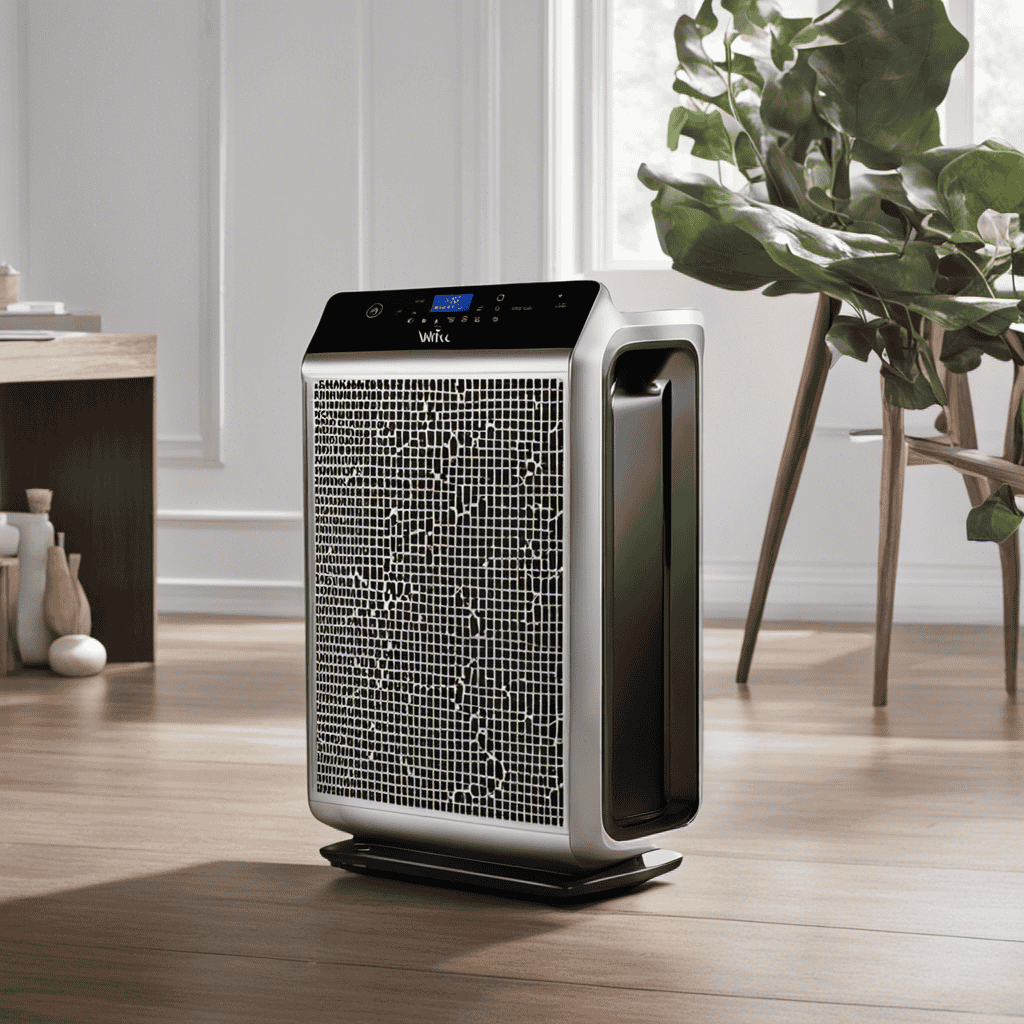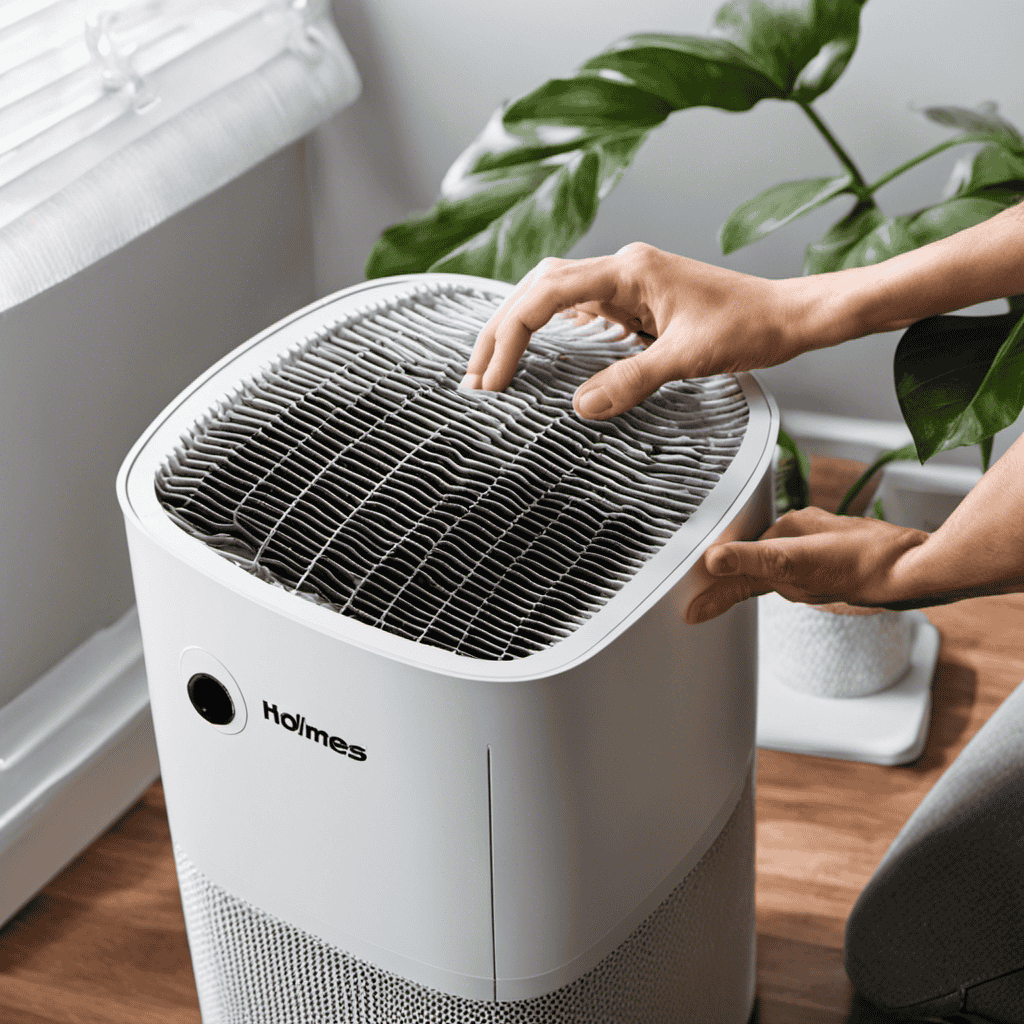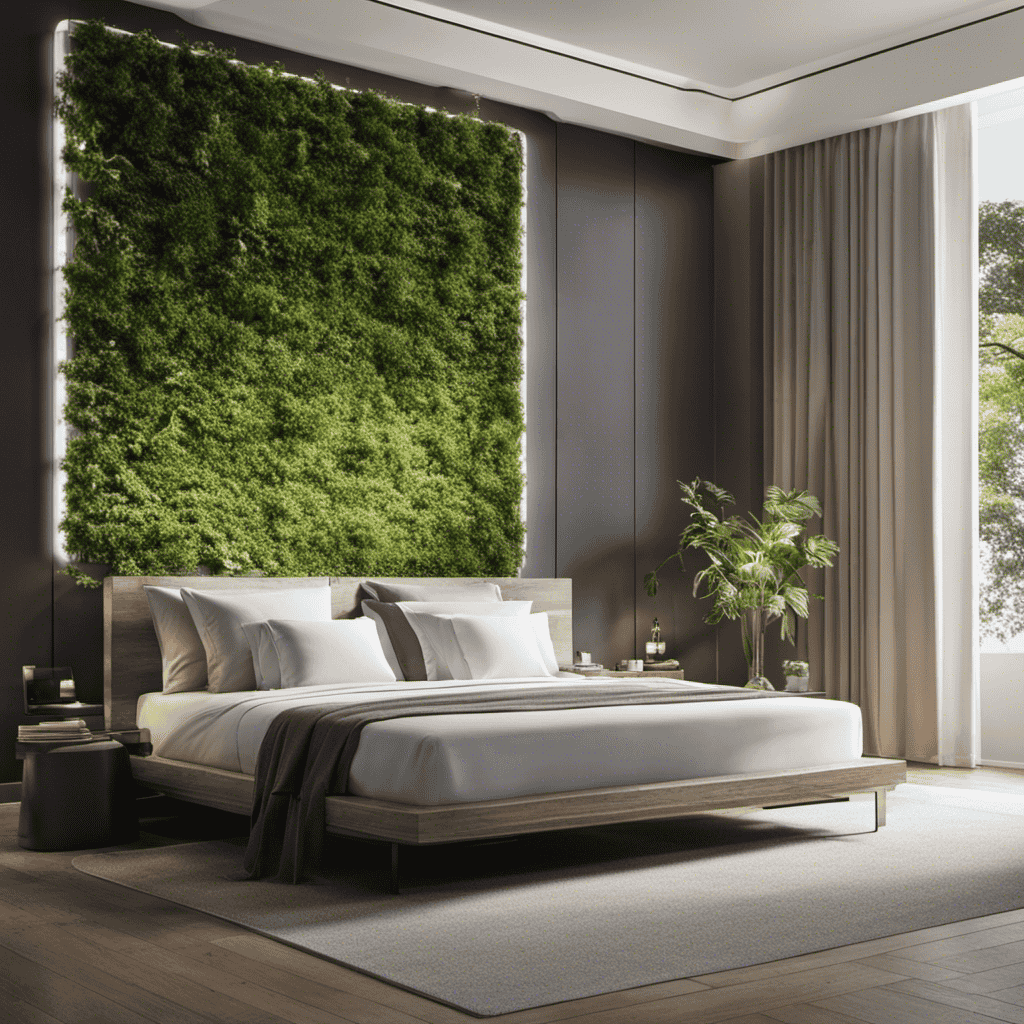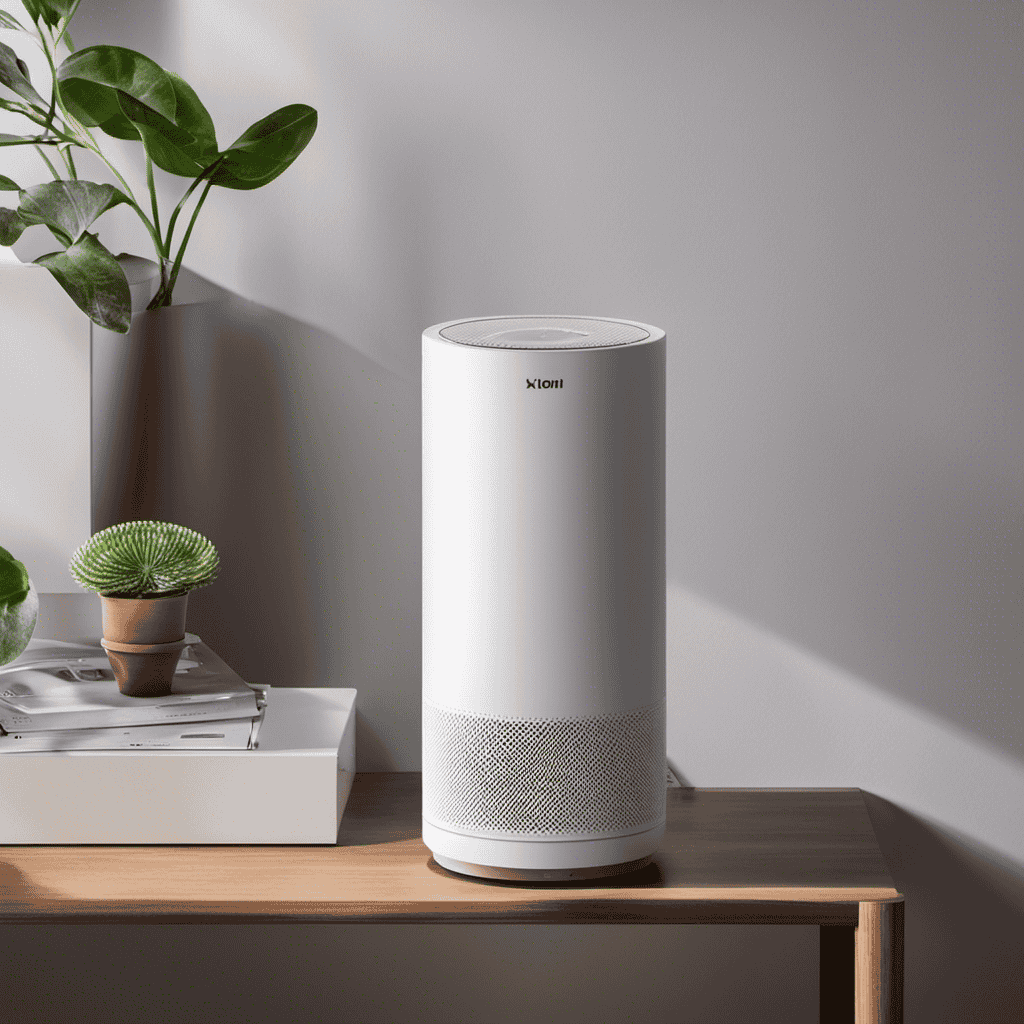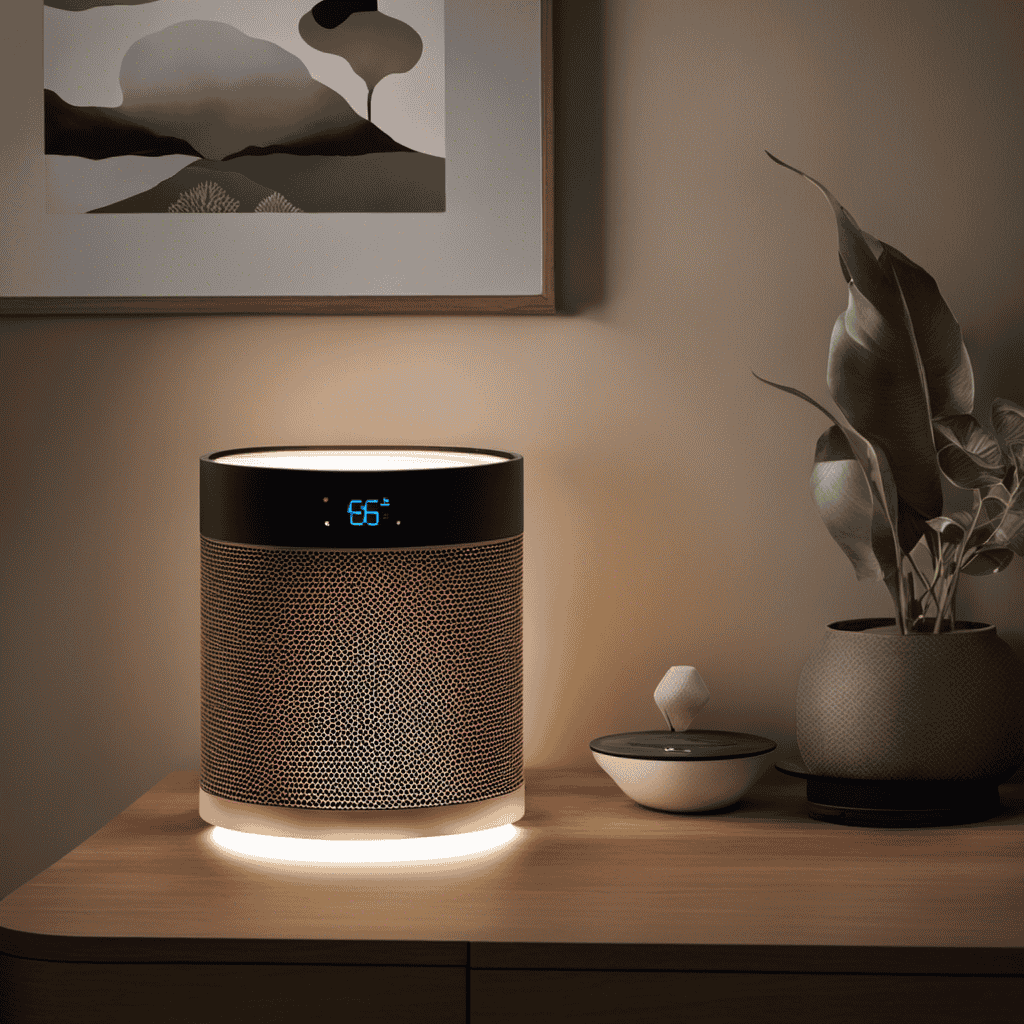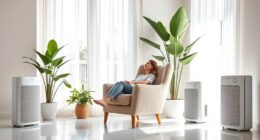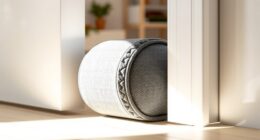Considering purchasing an air purifier, are you? Let me inform you that it’s not as straightforward as selecting one randomly from a store shelf.
There are a few things you need to check before making that purchase. Lucky for you, I’ve done the research and compiled a comprehensive guide on what to look for.
From important features to consider, to size and coverage area, to types of air filters – I’ve got you covered.
So sit back, relax, and let’s dive into the world of air purifiers.
Key Takeaways
- Advanced filtration systems like HEPA filters, activated carbon filters, or UV-C light technology are important features to consider when buying an air purifier.
- Size and coverage area should be taken into account, including room size compatibility, effective coverage range, filter replacement frequency, noise level, and energy consumption.
- Different types of air filters, such as HEPA filters, activated carbon filters, and ionizer filters, should be considered based on their lifespan and replacement frequency.
- Noise level is a key factor to consider, as a quiet air purifier can create a peaceful environment, improve sleep, concentration, reduce stress, and enhance mental health.
Important Features to Consider
When choosing an air purifier, it’s important to consider the features that are most important to you. With the rapid advancements in air purifier technology, there are a plethora of options available in the market. Conducting a thorough air purifier brand comparison is essential to determine which features align with your needs.
Look for brands that offer advanced filtration systems such as HEPA filters, activated carbon filters, or even UV-C light technology. These technologies are designed to effectively capture and eliminate pollutants, allergens, and even bacteria and viruses from the air. Additionally, consider features like air quality sensors, adjustable fan speeds, and noise levels.
By comparing different brands and their features, you can ensure that you choose an air purifier that meets your specific requirements.
Now, let’s move on to the next important factor to consider: size and coverage area.
Size and Coverage Area
When it comes to choosing an air purifier, there are a few key points to consider.
First and foremost is the room size compatibility – it’s important to ensure that the air purifier you choose is suitable for the size of the room you want to use it in.
Additionally, the effective coverage range of the air purifier is crucial to consider as it determines how well it can clean the air in a given space.
Lastly, the filter replacement frequency is an important factor to keep in mind as it will impact the maintenance and cost of the air purifier in the long run.
Room Size Compatibility
The first thing to consider before purchasing an air purifier is whether it’s compatible with the size of your room. It’s important to choose an air purifier that is suitable for the square footage of your space to ensure optimal performance.
Here are some factors to keep in mind:
- Noise Level: Look for an air purifier that operates quietly, especially if you plan to use it in a bedroom or office where noise can be disruptive.
- Energy Consumption: Check the energy efficiency of the air purifier to avoid high electricity bills. Look for models with energy-saving features or certifications like ENERGY STAR.
Effective Coverage Range
To make sure you choose the right air purifier, it’s crucial to consider the effective coverage range of the device for your specific room size.
The effective coverage range refers to the maximum area that the air purifier can effectively clean and purify. Different air purifiers have different room size recommendations, so it’s important to match the purifier’s coverage range with the size of your room.
This ensures that the air in your room is thoroughly cleaned and purified. Additionally, some air purifiers come with air quality sensors that detect the level of pollutants in the room and adjust the purification settings accordingly.
These sensors provide real-time data on the air quality and help maintain a healthy and clean environment. So, when choosing an air purifier, consider the effective coverage range and look for models with air quality sensors for optimal performance.
Filter Replacement Frequency
It’s important to regularly replace the filters in your air purifier to ensure optimal performance. Neglecting to change the filters can result in reduced air quality and decreased efficiency of your purifier.
Here are some key points to consider regarding filter replacement:
- Air Filter Lifespan: The lifespan of an air filter varies depending on factors such as the quality of the filter and the level of air pollution in your area. On average, filters should be replaced every 3 to 6 months.
- Filter Replacement Cost: The cost of air filter replacements can vary depending on the brand and model of your air purifier. It’s important to factor in the cost of replacement filters when considering the overall cost of owning an air purifier.
- Performance Impact: Regularly replacing filters ensures that your air purifier is functioning at its best, effectively removing pollutants from the air and improving indoor air quality.
- Health Benefits: Clean filters help to reduce the presence of allergens, dust, and other harmful particles in the air, which can have a positive impact on your respiratory health.
Types of Air Filters
Make sure you understand the different types of air filters available before making a decision on which air purifier to buy. The type of air filter used in an air purifier is crucial for both longevity and air quality improvement.
There are three main types of air filters: HEPA filters, activated carbon filters, and ionizer filters.
HEPA filters are highly effective in trapping small particles, such as dust, pollen, and pet dander, improving air quality significantly. They have a long lifespan and only require replacement every 6 to 12 months.
Activated carbon filters are excellent for removing odors and harmful gases from the air. They typically need to be replaced every 3 to 6 months.
Ionizer filters release negative ions into the air to neutralize pollutants. They don’t require replacement, but the ionizing plate may need occasional cleaning.
Understanding the different types of air filters will help you choose the right air purifier for your specific needs, ensuring longevity and improved air quality.
Noise Level
When it comes to choosing an air purifier, one of the key factors to consider is the noise level. As someone who values a peaceful environment, I prefer an air purifier that operates silently.
However, it’s important to take into account your noise tolerance level and whether you can tolerate a slightly louder purifier for the sake of better air quality.
Quiet or Loud
If you want a quieter air purifier, you should look for one with a noise level below 50 decibels. Having a quiet air purifier has its advantages, whether you use it indoors or outdoors.
Here are some reasons why a quieter air purifier is beneficial for your health:
- Better Sleep: A loud air purifier can disrupt your sleep, while a quiet one ensures a peaceful night’s rest.
- Concentration: When working or studying, a quiet air purifier helps to maintain focus and productivity.
- Stress Reduction: Excessive noise can increase stress levels, but a quiet air purifier creates a calm and relaxing environment.
- Improved Mental Health: A quieter air purifier promotes a tranquil atmosphere, which has a positive impact on mental well-being.
Choosing a quiet air purifier not only provides you with cleaner air but also enhances your overall health and well-being.
Noise Tolerance Level
Having a noise tolerance level is important when choosing any appliance for your home. This is especially true when it comes to an air purifier. No one wants a loud and disruptive appliance in their living space. When considering the noise level of an air purifier, it is essential to take into account the room layout and the decibel level of the appliance. To help you make an informed decision, I have created a table that compares the noise levels of different air purifiers based on their decibel rating. This table will give you a visual representation of how loud or quiet each appliance is, allowing you to choose one that suits your noise tolerance level and the layout of your room.
| Air Purifier Model | Decibel Level | Noise Level |
|---|---|---|
| Model A | 40 dB | Quiet |
| Model B | 50 dB | Moderate |
| Model C | 60 dB | Loud |
| Model D | 35 dB | Very Quiet |
| Model E | 55 dB | Moderate |
Silent Operation Preferred?
Silent operation is often preferred when selecting an appliance for your home. When it comes to air purifiers, the noise level can be a deciding factor. Here are some reasons why silent operation is preferred over performance:
- Peaceful Environment: Having a quiet air purifier allows you to enjoy a peaceful atmosphere in your home without any disturbance.
- Better Sleep: A silent air purifier ensures a good night’s sleep as it won’t disrupt your sleep patterns with constant noise.
- Concentration: If you use an air purifier in your workspace, a silent operation will help you stay focused and productive.
- Reduced Stress: Noise pollution can increase stress levels, so a silent air purifier can help create a calm and relaxing environment.
Transitioning into the next section about energy efficiency, it is important to consider not only the noise level but also the energy consumption of an air purifier.
Energy Efficiency
When looking for an air purifier, you should consider the energy efficiency of the product. Energy consumption is an important factor to consider as it directly impacts both your electricity bills and the environment.
A highly efficient air purifier will consume less energy, saving you money in the long run and reducing your carbon footprint. To determine the energy efficiency of an air purifier, you can check its ENERGY STAR rating or look for the Energy Efficiency Ratio (EER) mentioned in the product specifications.
Additionally, consider the type of filtration system used in the air purifier, as some systems may require more energy to operate effectively. By choosing an energy-efficient air purifier, you can ensure cleaner air while minimizing your environmental impact.
Maintenance Requirements
After considering the energy efficiency of an air purifier, it’s important to also think about its maintenance requirements. Maintaining your air purifier is crucial for its longevity and optimal performance. Here are some factors to consider:
- Air purifier lifespan: Different models and brands have varying lifespans. It’s important to choose one that has a longer lifespan to avoid frequent replacement.
- Filter replacement: Most air purifiers come with filters that need to be replaced regularly. Consider the cost and availability of replacement filters before making a purchase.
- Cleaning requirements: Some air purifiers require regular cleaning to remove dust and debris from the filters and other components. Check the cleaning instructions and consider how much time and effort you are willing to invest in maintenance.
- Maintenance cost: In addition to filter replacements, consider other maintenance costs such as electricity usage and any additional accessories required.
Considering these factors will help you assess the long-term maintenance requirements and costs associated with the air purifier you are considering.
Now let’s move on to explore additional features and functions to further enhance your air purification experience.
Additional Features and Functions
To enhance your air purification experience, you’ll want to consider the additional features and functions available in different models and brands of air purifiers. One important feature to look for is smart technology integration. This allows the air purifier to connect to your home network and be controlled remotely using your smartphone or other devices. With smart technology, you can easily adjust settings, monitor air quality, and receive notifications when the filters need to be replaced.
Another key feature to consider is air quality monitoring. Some air purifiers have built-in sensors that continuously monitor the air quality in your home. These sensors can detect pollutants such as dust, pollen, and pet dander, and automatically adjust the purification settings accordingly. This ensures that you are always breathing clean and healthy air.
When choosing an air purifier, it’s important to carefully review the additional features and functions offered by different models. By selecting a purifier with smart technology integration and air quality monitoring, you can have peace of mind knowing that you are getting the most effective and efficient air purification system for your home.
Customer Reviews and Ratings
Customer reviews and ratings provide valuable insights into the performance and satisfaction of different air purifier models. These reviews can help us make informed decisions when purchasing an air purifier.
Here are a few reasons why customer reviews are important:
- Real-life experiences: Customer reviews allow us to learn from the experiences of others who have already used the air purifier. We can get a sense of how well it performs in different environments and if it meets our specific needs.
- Performance evaluation: Customers often share their thoughts on the effectiveness of an air purifier in removing allergens, dust, and odors from the air. These insights help us gauge the performance of the device and determine if it aligns with our expectations.
- Long-term reliability: Reviews often mention the durability and reliability of an air purifier over time. This information is crucial in understanding if the device will last and continue to perform well in the long run.
- Overall satisfaction: Customer ratings provide an overall satisfaction score, giving us an idea of how well-regarded the air purifier is among its users. This helps us assess if it is a reliable choice for improving indoor air quality.
Price Range and Budget
After considering customer reviews and ratings, the next important factor to consider when buying an air purifier is the price range and budget.
It is crucial to understand the cost considerations and explore affordability options before making a final decision. Air purifiers come in a wide range of prices, depending on their features, size, and brand.
Setting a budget beforehand will help narrow down the options and prevent overspending. Additionally, it is essential to factor in the long-term costs of owning an air purifier, such as filter replacements and energy consumption.
Some models may have lower upfront costs but higher maintenance expenses. Therefore, it is crucial to weigh the initial cost against the long-term expenses to ensure the chosen air purifier fits within your budget and provides the desired air quality improvements.
Frequently Asked Questions
Can an Air Purifier Completely Eliminate All Types of Indoor Air Pollutants?
An air purifier can effectively reduce the presence of various indoor air pollutants, but it may not completely eliminate all types. Factors such as the purifier’s filtration system and the specific pollutants present should be considered before purchasing.
How Long Do Air Filters Typically Last Before They Need to Be Replaced?
Air filter lifespan varies depending on usage and quality. It is recommended to replace air filters every 3 to 6 months, or as indicated by the manufacturer. Regularly checking and replacing filters ensures optimal air purification.
Is It Safe to Use an Air Purifier in a Room Where a Baby or Young Child Sleeps?
Using an air purifier in a baby’s room is safe as long as you choose a model with a HEPA filter. HEPA filters are highly efficient at removing airborne particles, ensuring a clean and healthy environment for your little one.
Are There Any Potential Health Risks Associated With Using an Air Purifier?
There can be potential side effects and long-term effects associated with using an air purifier. It’s important to research and choose a purifier that meets safety standards and is suitable for your specific needs.
Can an Air Purifier Help Reduce the Spread of Viruses and Bacteria in the Air?
An air purifier can help reduce the spread of viruses and bacteria in the air. Regular maintenance is important to ensure its effectiveness. Before buying one, it’s crucial to check for features like HEPA filters and AHAM certification.
Conclusion
In conclusion, purchasing an air purifier is a decision that should not be taken lightly. It is crucial to consider important features such as size, coverage area, air filters, noise level, energy efficiency, and maintenance requirements.
Additionally, looking into additional features and functions, reading customer reviews and ratings, and setting a price range and budget are essential steps in making an informed choice.
By considering all these factors in parallel, you can ensure that you select the perfect air purifier that meets your specific needs and provides clean, fresh air for you and your loved ones.

